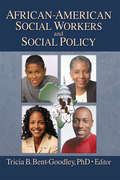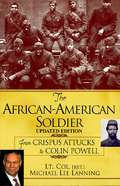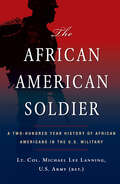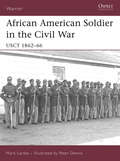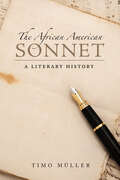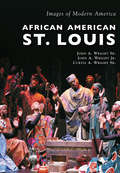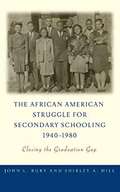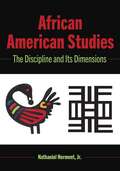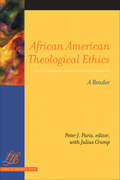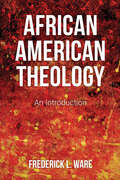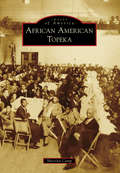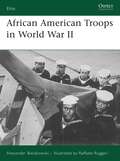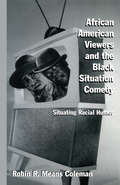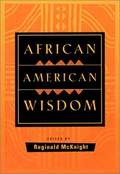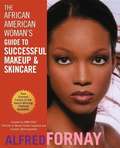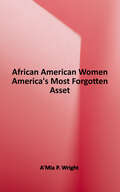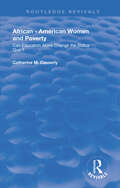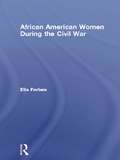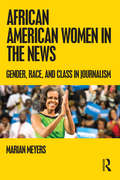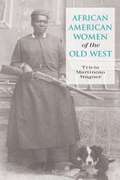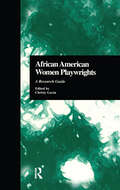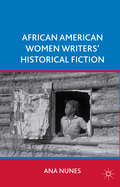- Table View
- List View
African-American Social Workers and Social Policy
by Carlton Munson Tricia Bent-GoodleyCritical analyses of policies that significantly affect African-American families and communities! African-American Social Workers and Social Policy is the first book of its kind to combine the voices of African-American social work professionals on social policy in one volume. You'll learn about the impact of health, child welfare, and aging, the implications of welfare reform, and the harsh statistics about race and imprisonment from respected practitioners in the field. Each chapter ends with recommendations for policy advocacy, giving you the tools you need to help reform the system. The issues addressed in African-American Social Workers and Social Policy include: how proposed Social Security reforms can help or hinder efforts to bridge the wealth gap the role of grandparents as caregivers the implications of child welfare policies, including the Multi-Ethnic Placement Act of 1994 the effects of race, class, and gender discrimination on African-American women's health the significance of the Human Genome Project how social workers can stand up to the biases of the criminal justice system African-American Social Workers and Social Policy also presents an eye-opening review of the history of mental health policies for African Americans and an action agenda focused on knowledge and empowerment as a solution to pervasive institutional racism. This book is a welcome forum for policy educators, advocates, and those committed to social justice. You will value African-American Social Workers and Social Policy for its clear identification of issues, thorough analysis of the social policy arena and its impact, and comprehensive description of new goals, directions, and possibilities. This book will help you better understand vital social policies that affect African Americans today.
The African American Soldier: From Crispus Attucks To Colin Powell (updated)
by Lanning Lt. Col. Ret. Michael"For more than two hundred years African Americans have fought for their own personal freedom as well as that of their fellow Americans. Blacks contributed to the success of the revolution that gained the country, but not its slaves, their independence. Blacks played a significant role in preserving the union in the Civil War and securing their own freedom. From the expanse of the American West to the heights of San Juan Hill, from the trenches of France to the heartlands of Germany and Japan, from the icy mountain ridges of Korea to the thick jungles of Vietnam and the sands of the Persian Gulf, African Americans have performed loyally and bravely. "--From The African-American SoldierIn this moving and revealing account, Michael Lee Lanning brings to life the battles in which African Americans fought so courageously to become full citizens by risking their lives for their country. This updated edition includes analyses of African-American soldiers' involvement in recent U. S. conflicts, including the wars in Afghanistan and Iraq. Michael Lee Lanning serves as public affairs officer for General H. Norman Schwarzkopf. He has spent more than twenty years on active duty in the United States Army. He has written nine books of military history, including The Military 100 and Senseless Secrets. He lives in Phoenix, Arizona.
The African American Soldier: From Crispus Attucks to Colin Powell
by Lt. Col. Michael LanningMore than five thousand blacks joined the rebel Americans in the war as soldiers, sailors, and marines; many more supported the rebellion as laborers. Their service went largely unrecognized and unrecorded.Few letters, journals, or other narratives by blacks about the Revolution exist because whites had denied most African Americans an education. White historians of the period, and for years after the war, ignored the contributions and impact of thousands of blacks participants for several reasons. First of all, prejudices were so deeply ingrained that it did not even occur to most whites of the time that blacks had played a significant role either as individuals who fought or labored or as a segment of the population that affected decisions. Prejudices also prevented some who did witness the contributions of African Americans from honestly reporting that blacks could perform equally with whites on the battlefield if given the opportunity. Others did not mention blacks because of the difficulty of explaining why the United States kept half a million men, women, and children enslaved while fighting for independence and liberty." From Defenders of Liberty, by Lt. Col. Michael Lee Lanning (Ret.)
African American Soldier in the Civil War
by Peter Dennis Mark LardasApproximately 200,000 African Americans fought for the Union during the Civil War. Initially, many white soldiers doubted their bravery and skill; they were soon proved wrong. The United States Colored Troops performed countless acts of courage, most famously at the battle of Fort Wagner where the 54th Massachusetts marched forth and scaled the parapets, only to be driven back in fierce hand-to-hand combat. Through fascinating first-hand accounts, this title examines the journey of the African American from slave to soldier to free man, ultimately providing a fascinating insight into the impact that these brave men had on the war and how it influenced their lives thereafter.
The African American Sonnet: A Literary History (Margaret Walker Alexander Series in African American Studies)
by Timo MüllerSome of the best known African American poems are sonnets: Claude McKay's "If We Must Die," Countee Cullen's "Yet Do I Marvel," Gwendolyn Brooks's "First fight. Then fiddle." Yet few readers realize that these poems are part of a rich tradition that formed after the Civil War and comprises more than a thousand sonnets by African American poets. Paul Laurence Dunbar, Jean Toomer, Langston Hughes, Margaret Walker, and Rita Dove all wrote sonnets.Based on extensive archival research, The African American Sonnet: A Literary History traces this forgotten tradition from the nineteenth century to the present. Timo Müller uses sonnets to open up fresh perspectives on African American literary history. He examines the struggle over the legacy of the Civil War, the trajectories of Harlem Renaissance protest, the tensions between folk art and transnational perspectives in the thirties, the vernacular modernism of the postwar period, the cultural nationalism of the Black Arts movement, and disruptive strategies of recent experimental poetry.In this book, Müller examines the inventive strategies African American poets devised to occupy and reshape a form overwhelmingly associated with Europe. In the tightly circumscribed space of sonnets, these poets mounted evocative challenges to the discursive and material boundaries they confronted.
African American St. Louis: Disappearing Black Communities (Images of Modern America)
by John A. Wright Sr. Curtis A. Wright Sr. John A. Wright Jr.The city of St. Louis is known for its African American citizens and their many contributions to the culture within its borders, the country, and the world. Images of Modern America: African American St. Louis profiles some of the events that helped shape St. Louis from the 1960s to the present. Tracing key milestones in the city's history, this book attempts to pay homage to those African Americans who sacrificed to advance fair socioeconomic conditions for all. In the closing decades of the Great Migration north, the civil rights movement was taking place nationally; simultaneously, St. Louis's African Americans were organizing to exert political power for greater control over their destiny. Protests, voter registration, and elections to public office opened new doors to the city's African Americans. It resulted in the movement for fairness in hiring practices and the expansion of the African American presence in sports, education, and entertainment.
The African American Struggle for Secondary Schooling, 1940-1980: Closing the Graduation Gap
by John L. Rury Shirley A. HillThis is the first comprehensive account of African American secondary education in the postwar era. Drawing on quantitative datasets, as well as oral history, this compelling narrative examines how African Americans narrowed the racial gap in high school completion. <p><p> The authors explore regional variations in high school attendance across the United States and how intraracial factors affected attendance within racial groups. They also examine the larger social historical context, such as the national high school revolution, the civil rights movement, campaigns to expand schooling and urging youth to stay in school, and Black migration northward. Closing chapters focus on desegregation and the "urban crisis" of the 1960s and 1970s that accelerated “White flight” and funding problems for urban school systems. <p><p> The conclusion summarizes these developments and briefly looks at the period since 1980, when secondary attainment levels stopped advancing for Blacks and Whites alike.
African American Studies: The Discipline And Its Dimensions (Black Studies And Critical Thinking Ser. #110)
by Nathaniel NormentAfrican American Studies: The Discipline and Its Dimensions is a comprehensive resource book that recounts the development of the discipline of African American Studies and provides a basic reference source for sixteen areas of knowledge of the discipline: anthropology, art, dance, economics, education, film, history, literature, music, philosophy, psychology, religion, sociology, political science, science and technology, sports and religion. African American Studies defines bodies of knowledge, methodologies, philosophies, disciplinary concepts, contents, scope, topics scholars have concerned themselves, as well as the growth, development, and present status of the discipline. African American Studies validates that African American Studies is a unique and significant discipline—one that intersects almost every academic discipline and cultural construct—and confirms that the discipline has a noteworthy history and a challenging future. The various bodies of knowledge, the philosophical framework, methodological procedures, and theoretical underpinnings of the discipline have never been clearly delineated from an African-centered perspective.
African American Studies Kennedy-King College
by Editors at the PearsonThis book on African American studies covers topics like : Black People in Colonial North America,The Meaning of Freedom: The Promise of Reconstruction,The Failure of Reconstruction,White Supremacy Triumphant,Black Nationalism, Black Power, Black Arts etc.
African American Theological Ethics: A Reader
by Peter J. Paris Editor Julius CrumpThis volume in the Library of Theological Ethics series draws on writings from the early nineteenth through the late twentieth centuries to explore the intersection of black experience and Christian faith throughout the history of the United States. The first sections follow the many dimensions of the African American struggle with racism in this country: struggles against theories of white supremacy, against chattel slavery, and against racial segregation and discrimination. The latter sections turn to the black Christian vision of human flourishing, drawing on perspectives from the arts, religion, philosophy, ethics, and theology. It introduces students to major voices from African American Christianity, including Frederick Douglass, Richard Allen, W. E. B. DuBois, Marcus Garvey, Martin Luther King Jr., Bayard Rustin, Barbara Jordan, James H. Cone, and Jacqueline Grant. This is the essential resource for anyone who wishes to understand the role that Christian faith has played in the African American struggle for a more just society.
African American Theology: An Introduction
by Frederick L. WareThis book presents a substantial introduction to the major methodologies, figures, and themes within African American theology. Frederick L. Ware explores African American theology from its inception and places it within dual contexts: first, the African American struggle for dignity and full humanity; and second, the broader scope of Christian belief. Readers will appreciate Ware's demonstration of how black theology is expressed in a wide range of sources that includes not only scholarly publications but also African American sermons, music, news and editorials, biography, literature, popular periodicals, folklore, and philosophy. Each chapter concludes with questions for discussion and suggested resources for further study. Ware provides a seasoned perspective on where African American theology has been and where it is going, and he demonstrates its creativity within the chorus of Christian theology.
African American Topeka (Images of America)
by Sherrita CampAfrican Americans arrived in Topeka right before and after the Civil War and again in large numbers during the Exodus Movement of 1879 and Great Migration of 1910. They came in protest of the treatment they received in the South. The history of dissent lived on in Topeka, as it became the home to court cases protesting discrimination of all kinds. African Americans came to the city determined that education would provide them a better life. Black educators fostered a sense of duty toward schooling, and in 1954 Topeka became a landmark for African Americans across the country with the Brown vs. Topeka Board of Education case. Blacks from every walk of life found refuge in Kansas and, especially, Topeka. The images in African American Topeka have been selected to give the reader a glimpse into the heritage of black life in the community. The richness of the culture and values of this Midwestern city are a little-known secret just waiting to be exhibited.
African American Troops in World War II
by Alexander Bielakowski Raffaele RuggeriOsprey's study of the African Americans' involvement in World War II (1939-1945). Despite the contribution of black units to the American Expeditionary Force in World War I (1914-1918), and the commissioning of hundreds of black officers to lead them, the small interwar US Army continued to regard them as unsuited to both leadership roles and handling modern technology. Although African Americans had to strive against prejudice for every chance to show what they could achieve, in fact the wartime US Army conceded opportunities for leadership unparaleled in American civil society at that date. In World War II tens of thousands served in segregated units. While the majority were denied the opportunity of combat, a minority of all-black, black-officered units proved their worth in all theaters and a number of roles: black officer fighter pilots (the "Tuskegee Airmen") blazed the trail, followed by several tank and tank-destroyer battalions and a few field artillery units; and more than 20,000 black infantrymen served under both white and black officers. The Army also created the first fully integrated units, whose success prompted President Truman to order the complete integration of the military in 1948. The US Navy and Marines were slower to allow blacks to serve in combat roles and to commission black officers, but by 1945 two complete ships' companies were composed of African-Americans (though with white officers).
African American Viewers and the Black Situation Comedy: Situating Racial Humor (Studies in African American History and Culture)
by Robin R. Means ColemanProviding new insight into key debates over race and representation in the media, this ethnographic study explores the ways in which African Americans have been depicted in Black situation comedies-from 1950's Beulah to contemporary series like Martin and Living Single.
The African American Voice in U.S. Foreign Policy Since World War II
by Michael L. KrennFollowing World War II, America was witness to two great struggles. The first was onthe international front and involved the fight for freedom around the globe, as millionsof people in Asia and Africa rose up to throw off their European colonial masters. Inthe decades following 1945 dozens of new nations joined the ranks of independentcountries. Following the Civil War, the African-American voice in U.S. foreign affairscontinued to grow. In the late nineteenth century, a few African-Americans — such asFrederick Douglass — even served as U.S. diplomats to the "black republics" of Liberiaand Haiti. When America began its overseas thrust during the 1890s, African-Americanopinion was divided.
African American Voices: The Life Cycle of Slavery
by Steven Mintz<p>The 58 selections in this volume cover the history of slavery in America, moving from memories of growing up in Africa to the trials of the Middle Passage, the horrors of the auction block, the sustaining forces of family and religions, acts of resistance, and the meaning of the Civil War and emancipation, presenting 300 years in the collective life cycle of an enslaved people. <p>Mintz's extensive introduction is followed by substantial excerpts from published slave narratives, interviews with former slaves, and letters written by enslaved African Americans. The end of the volume includes a bibliographic essay and a 40-page bibliography, making this an indispensible book for the study of slavery.</p>
African American Wisdom (revised and expanded edition)
by Reginald Mcknight"A new broom sweep clean, but an old brush knows the corners." --Anonymous There's a time when you have to explain to your children why they're born, and it's a marvelous thing if you know the reason by then. --HAZEL SCOTT Love, I find is like singing. Everybody can do enough to satisfy themselves, though it may not impress the neighbors as being very much. --ZORA NEALE HURSTON This is a wonderful collection!
The African American Woman's Guide To Successful Makeup and Skincare (Revised Edition)
by Alfred FornayThe Ultimate Guide to Successful Makeup and Skincare for Every Woman of Color Who Wants to Look and Feel Her Best. A complete listing of cosmetic products, tools to use, and professional techniques to design your best look. The best products for your skin type and the best colors for your complexion. What corrective beauty products to buy and what regular skincare regimen to follow. Solutions to your beauty problems, including nutrition, nail care, and hair care. Great advice from the women whose looks you love.
African American Women: America's Most Forgotten Asset
by A'Mia P. WrightWithin this book, the author aimed to restore, rehabilitate, and mend African-American Women and the community. The entire world has acknowledged the issues African Americans face as a culture, however, no one has advanced toward assimilating relationships within the culture. As resilient of a people as African Americans are the culture still need a leader, still need guidance, and still need reassurance. It is believed that African-American Women are the key to turning everything around and remodeling the foundation that was once laid. The potency of African-American Women is so prodigious that it has the power of an atomic bomb. Today's leaders for African Americans are outnumbered and rejected because in the community today, stupidity reigns over knowledge and foolishness is the new cute.
African-American Women and Poverty: Can Education Alone Change the Status Quo?
by Catherine M. CasserlyIn the United States, public policies designed to reduce poverty are overwhelmingly influenced by human capital theory, since education is viewed as the powerful mechanism by which productivity will increase, incomes will be raised, and economic opportunity will be provided. Although African-American women followed the prescription set forth by human capital theory and increased their educational attainment by over 2 years from the late 1960s to the late 1980s, their incidence of poverty remained fairly stable. First published in 1998, this study examines why educational investments by that population most susceptible to being poor, African- American females, have not reduced poverty as expected.
African American Women During the Civil War (Studies in African American History and Culture)
by Ella ForbesThis study uses an abundance of primary sources to restore African American female participants in the Civil War to history by documenting their presence, contributions and experience. Free and enslaved African American women took part in this process in a variety of ways, including black female charity and benevolence. These women were spies, soldiers, scouts, nurses, cooks, seamstresses, laundresses, recruiters, relief workers, organizers, teachers, activists and survivors. They carried the honor of the race on their shoulders, insisting on their right to be treated as "ladies" and knowing that their conduct was a direct reflection on the African American community as a whole.For too long, black women have been rendered invisible in traditional Civil War history and marginal in African American chronicles. This book addresses this lack by reclaiming and resurrecting the role of African American females, individually and collectively, during the Civil War. It brings their contributions, in the words of a Civil War participant, Susie King Taylor, "in history before the people."
African American Women in the News: Gender, Race, and Class in Journalism
by Marian MeyersAfrican American Women in the News offers the first in-depth examination of the varied representations of Black women in American journalism, from analyses of coverage of domestic abuse and "crack mothers" to exploration of new media coverage of Michelle Obama on Youtube. Marian Meyers interrogates the complex and often contradictory images of African American women in news media through detailed studies of national and local news, the mainstream and Black press, and traditional news outlets as well as newer digital platforms. She argues that previous studies of African Americans and the news have largely ignored the representations of women as distinct from men, and the ways in which socioeconomic class can be a determining factor in how Black women are portrayed in the news. Meyers also proposes that a pattern of paternalistic racism, as distinct from the "modern" racism found in previous studies of news coverage of African Americans, is more likely to characterize the media's treatment of African American women. Drawing on critical cultural studies and black feminist theory concerning representation and the intersectionality of gender, race and class, Meyers goes beyond the cultural myths and stereotypes of African American women to provide an updated portrayal of Black women today. African American Women in the News is ideal for courses on African American studies, American studies, journalism studies, media studies, sociology studies, women’s studies and for professional journalists and students of journalism who seek to improve the diversity and sensitivity of their journalistic practice.
African American Women of the Old West
by Tricia Martineau WagnerThe brave pioneers who made a life on the frontier were not only male; and they were not only white. The story of African-American women in the Old West is one that has largely gone untold--until now. The story of ten African-American women is reconstructed from historic documents found in century-old archives. The ten remarkable women in Black Women of the Old West were all born before 1900, some were slaves, some were free, and some lived both ways during their lifetime. Among them were laundresses, freedom advocates, journalists, educators, midwives, business proprietors, religious converts, philanthropists, mail and freight haulers, and civil and social activists.
African American Women Playwrights: A Research Guide (Critical Studies in Black Life and Culture #31)
by Christy GavinFirst Published in 1999. Routledge is an imprint of Taylor & Francis, an informa company.
African American Women Writers’ Historical Fiction
by Ana NunesThis volume explores African American historical fiction written by women in the last four decades of the twentieth century. Nunes' approach to the texts aims at emphasizing the narrative and thematic achievements of individual novels set in the context of the main trends and developments of the contemporary African American historical novel.
